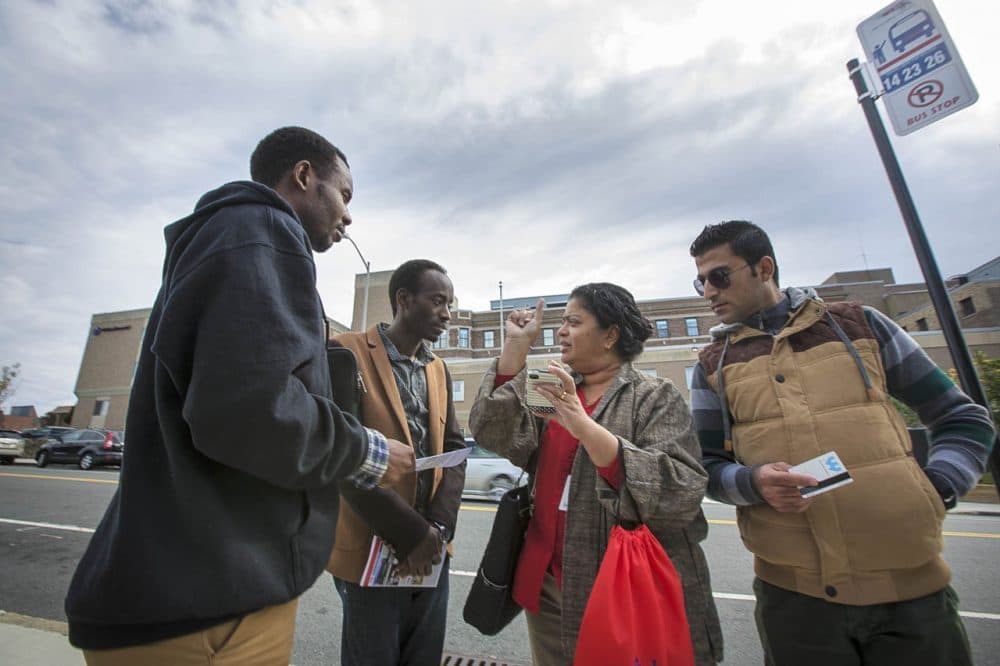Advertisement
How Refugees Make It To Massachusetts

President Trump's recent executive order on immigration is currently on hold after a series of court decisions. (An appeals court hears arguments on the case Tuesday.) The order barred U.S. travel from seven predominately Muslim nations, and temporarily shut down the U.S. refugee resettlement program and denied entry of Syrian refugees indefinitely.
Now that Trump's travel ban is at least temporarily halted, refugee resettlement agencies here in Massachusetts are working to reschedule flights and plan for the arrival of families and individuals with approved refugee status.
Here's a look at how refugees make it to Massachusetts:
A 2-Part Vetting Process
Trump campaigned on a promise to implement "extreme vetting" for people looking to enter the U.S., saying the current process is insufficient. Groups like the Center for Immigration Studies, which supports limiting immigration, have said the resettlement system is due for an overhaul.
However, most experts familiar with the vetting and interview process say people applying for refugee status are among the most strictly screened immigrants allowed to enter the U.S.
A refugee -- which the United Nations High Commission for Refugees (UNHCR) defines as "someone who has been forced to flee his or her country because of persecution, war, or violence" — must first register with the UNHCR. The UNHCR conducts an initial screening and determines whether a family or individual is eligible for resettlement. Women and children, people with medical needs, and those who have family relocated elsewhere are considered prime candidates for resettlement.

Refugees do not choose which country they are to be resettled in, and often don't find out where they're headed until just weeks before they depart. Refugees who have U.S. ties or family or friends already living in the country are particularly strong candidates for resettlement in the U.S.
Once the UNHCR recommends a refugee or a family for resettlement to the U.S., the federal government takes over the screening process. Each member of a family undergoes a thorough background check and a battery of interviews with the National Counterterrorism Center, the FBI, the Department of Defense, the Department of Homeland Security and the Department of State. According to the State Department, "refugees are screened more carefully than any other type of traveler to the U.S."
Next come fingerprint security checks, cultural orientation classes and medical screenings. According to resettlement agencies, this entire process can take between two and four years. It's only after clearing this entire process that refugees are assigned a destination for resettlement within the U.S.
Advertisement
Additionally, refugees from civil war-torn Syria undergo extra screening that applies specifically to their country. They're asked what part of the nation they fled and why. Stories among families are cross-checked to ensure consistency.
Assigning A U.S. Destination
There are nine national resettlement agencies throughout the country, many of which are faith-based organizations. These so-called "voluntary agencies" determine which individuals and families may be a good fit for a particular community.
Local offices are in Boston, Framingham, Lowell, Springfield, West Springfield and Worcester.
These agencies take multiple factors into account when assigning destinations. Family ties, affordable housing, entry-level jobs and availability of public transportation are among the top considerations. The existing refugee community and support system in any given city are also taken into account.
Over the last decade, Worcester and Springfield have welcomed the largest number of refugee families, according to State Department data.
How A Destination Becomes A Home
Local resettlement agencies take the lead once an individual or family is assigned a destination, and the flight is booked by the U.N.'s International Organization for Migration.
On average, staff have about a week's notice when preparing for new arrivals. There are staff or trained volunteers at the airport to greet refugees and take them to their new apartment or rental home, secured and paid for by the resettlement agency. At the new home, there are usually toys waiting for children, seasonal clothing donated by the community and culturally appropriate food ready for preparation.
Federal funding, donations and grants help agencies cover many of the resettlement costs for the first 90 days. After six months, there is an expectation that refugees will be mostly self-sustainable and that all working-age adults in the household will be employed.
Beyond providing the necessities of housing and food, resettlement agencies offer English classes and teach refugees how to open a bank account and navigate public transit. And, perhaps most importantly, they're the starting point for newcomers learning to call Massachusetts home.
